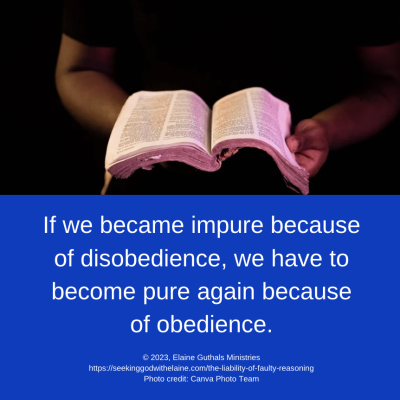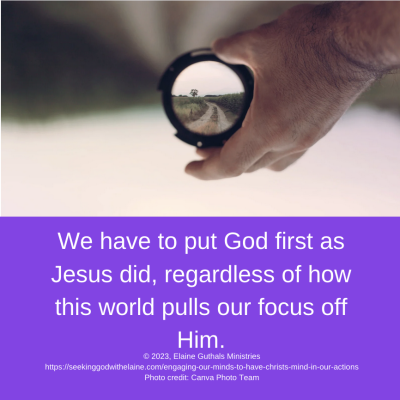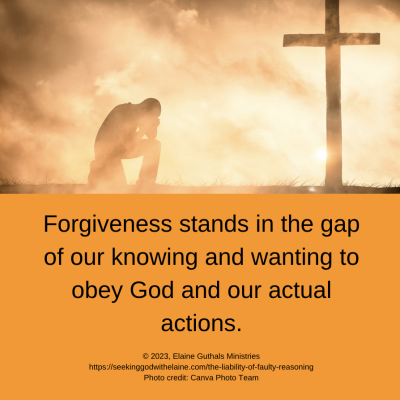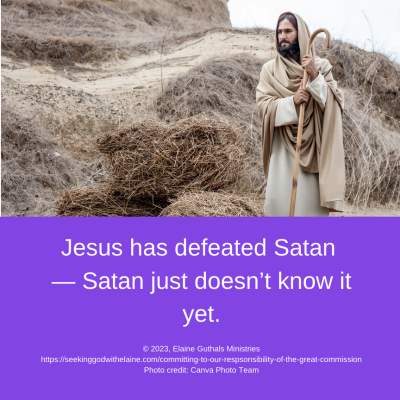
Main Nugget



Forming Our Habits to Grow Our Relationship with God
- All souls of mankind belong to God because He is our Creator and He cares for us. He did not show favoritism and claim only some of the souls. God claims all of them (Committing to Engage Our Soul).
- God cares for each and every one of us. He maintains a personal interest in all our dealings — both big and small (Committing to Engage Our Soul).
- Each soul is valued independently. Sin may have entered the world because of Adam’s sin, but our suffering is present for more than that. We endure suffering because of our own sins (Committing to Engage Our Soul).
- The original sin was disobeying God. He told them not to do something, and they went ahead and did it. Instead of never associating with Adam and Eve again after the original sin, God devised a plan so that our relationships with Him could be restored. That shows how loving and kind God is (Engaging Our Strength after We Choose the Gospel).
- God doesn’t want us to feel guilt over repented sins. He knew before He created us that we were going to disobey Him. He knew sin would be a part of our lives. That is because evil has always been here (The Liability of Guilt).
- There is no way we could have loved God first. We can’t love God with an unregenerated heart (Engaging Our Strength after We Choose the Gospel).
- God loves us so much that He sent His Son to pay the price of our sins. He offers us salvation to repair the damage done by sin. Only through accepting Jesus as our Savior and Redeemer can the penalty for our sins be paid (Committing to Engage Our Soul; Engaging Our Strength after We Choose the Gospel).
- Jesus knew before this world was created that we would disobey God and let sin into it. Even though Jesus hates sin so much, He felt that we should be restored when we believe in Him. He also knew that He was going to be the Sacrifice to pay the penalty for our sins (Engaging Our Minds to Have Christ’s Mind against Sin).
- Jesus hated sin so much that He came to die to pay the penalty for our sins. He willingly gave up His Deity to become like mankind to save us from the penalty of our sins. Jesus submitted His Will to God, always being obedient to Him (Engaging Our Minds to Have Christ’s Mind against Sin; Engaging Our Minds to Have Christ’s Mind in Our Actions).
- The Person Who has the authority to call us to the message has the authority to complete the work of salvation within us. Jesus doesn’t say, “You know, God wants to offer you salvation, but I really have nothing to do it.” Instead, Jesus says that is only through Him are we saved (Engaging in Christ to be Responsible).
- Jesus was set apart from the world. His attitude was that we aren’t of this world. Our separation from the world has to be because we have a different moral character than non-believers. They believe self should be the main focus. Jesus taught us that our focus has to be on God (Engaging Our Minds to Have the Mind of Christ).
- Jesus knew His mission was to provide salvation for the world. We are called to continue His mission of calling the lost to repentance. No, we don’t save people. Only Jesus can do that. But it is our mission to tell the world they need Him and He will provide salvation (Engaging the Mind of Christ to Serve Him).
- Our message isn’t about us, it is about Jesus. What we are preaching is how too apply Jesus’ message in our lives. We don’t get to adapt Jesus’ message to the worldview. We have to take Jesus’ message and apply it to circumstances in our lives so that we can follow Him, not the worldview. We aren’t doing this on our own. We are being sent by the Rabbi (Committing to Our Responsibility of the Great Commission; Engaging in Christ to be Responsible).
- Jesus committed to preparing the way for us to fulfill the Great Commission. We can do no less than carrying out our responsibilities (Committing to Our Responsibility of the Great Commission).
- If we are going to have the mind of Christ — the same attitude — we have to be humble as Jesus was. We also need to be righteous, content, meek, merciful, and sincere (Engaging Our Minds to Have Christ’s Mind against Sin).
- Purity is shown by having a renewed mind. That means we are confirming to the image of God. Relying on being made in His image isn’t going to cut it. Our attitudes and actions have to show we are reflecting Him. Knowing of Jesus isn’t enough. He has to change us. We need to divest ourselves of what used to be. (Engaging Our Minds to Have Christ’s Mind against Sin; Engaging Our Strength to Love God).
- We have to be more than made in His image. We have to be His image (The Liability of Faulty Reasoning).
- Jesus’ attitude did not change based on the situation He found Himself to be in at the moment. His attitude was the same regardless of the offense He might have felt at that time. It takes more power to keep Jesus’ attitude in everyday trials than it does to perform a perform a miracle over nature (Engaging Our Minds to Have Christ’s Mind in Our Actions).
- Jesus wasn’t a Save the Animals, Defeat Poverty, Defeat Global Warming kind of guy. He wasn’t out to make a big spectacle showing He was going to save the physical world. Instead, Jesus is interested in a personal, intimate relationship (Engaging Our Strength after We Choose the Gospel).
- Jesus knows our human weaknesses. Even though He is perfect and pure, He understands the challenges that we have. Jesus is touched by our weakness (sorrow, pain, and anguish) and loves us anyway whether we give into the temptation to sin or not. Oh, yes. He would much rather we didn’t commit the sin. But Jesus is still our High Priest when we do. It pains Him when we do not choose Him (Engaging the Mind of Christ to Serve Him).
- Jesus didn’t concern Himself with death, persecution, and what opinion others had of Him. He was focused on completing God’s Will (Engaging Our Minds to Have Christ’s Mind in Our Actions).
- Jesus can sympathize with us because He was tempted just as we are. He knows how difficult it can be to choose to follow God. The only difference between Jesus and us is that He always chose to be obedient to God. Many times, we choose not to (Engaging the Mind of Christ to Serve Him).
- When Jesus got back to Heaven, He did not forget all His earthly experiences and feelings. He can now use those to advocate for us to God (Engaging the Mind of Christ to Serve Him).
- We don’t serve a crucified Savior. We serve a risen Savior (Committing to Our Responsibility of the Great Commission).
- Our walk should always be about listening to the Holy Spirit in order to be obedient to God (Engaging Our Strength to Love God).
- Everything we do for God is considered preaching. Every song we sing, every child we teach, every benevolent gift we give should be preaching Jesus’s Gospel. Yes, there are times when we need to speak informally with people one on one. Other times, trained Pastor-Steve types must be telling a multitude in a church service. Both can be termed as preaching (Engaging in Christ to be Responsible).
- God is going to give everyone an opportunity to be gathered into the fold. When no one else is going to choose to submit to Him, He will send Jesus back to pick us up (Committing to Our Responsibility of the Great Commission).
- What is important here is that we have a choice to make. God didn’t create us to be synthetic beings who are just fancy robots. We choose between good and evil, light and dark, and pure and impure. In other words, we choose to obey or disobey God (The Liability of Guilt).
- Since we were created in God’s image, we are drawn toward good. When we choose evil, we feel the guilt created by our disobedience. This isn’t telling us we shouldn’t feel remorse for our disobedience. Feeling remorse is one of the ways we can know we did wrong. It will help us to repent and do things right. We can’t let the guilt take our hope. Our hope is in Jesus, Who has brought us salvation. The guilt helps us get to the repentance needed for salvation (The Liability of Guilt).
- God forgives us time and time again — when we sincerely ask (The Liability of Guilt).
- Our getting it right and getting it wrong is all a part of sanctification. We learn from our past mistakes. We grow through figuring out how to follow God’s Will (The Liability of Guilt).
- We have to put the guilt in the right place and use it to grow. We can be determined because God helps us to conquer sin. The great thing is we aren’t battling sin alone. God is with us. We can’t overcome Satan. God already has (The Liability of Guilt).
- We can boldly do whatever tasks God has assigned to us without feeling guilty. We have to be bold about doing God’s Will, not our own (The Liability of Guilt).
- God didn’t condemn us. We did that to ourselves when we disobeyed God. Worldview people like to tell just that God is only love and won’t judge us. If He does judge us, He won’t condemn us. When it says, God didn’t condemn the world, it means that God chose to design a way so that the world could be restored to Him. In other words, He didn’t wash His hands of us. God chose to save us (The Liability of Faulty Reasoning).
- We shouldn’t think God should have to be made to accept our actions and attitudes just because they are ours. We are nothing in His sight. He is Sovereign God. He is our Creator. He is just and righteous and holy. God is everything we are not (The Liability of Faulty Reasoning).
- It is an all-or-nothing deal with God. We can’t submit only part of ourselves to Him and call it enough. We have to be fully obedient (The Liability of Faulty Reasoning).
- Salvation can only be given to us by God only after we have fully submitted ourselves to Him. We have to acknowledge that He is Sovereign God (The Liability of Faulty Reasoning).
- When we follow the worldview’s faulty reasoning, we aren’t following God’s reasoning. Come Judgment Day, if our names are not written in His book of life – meaning we have submitted our lives to Him – we will be judged accordingly (The Liability of Faulty Reasoning).
- We are to submit to God’s Will and live our lives to glorify Him. That means we obey His laws and commandments. We don’t try to rewrite them because we think they should have evolved by now. We can’t think we can pick and choose which we will or won’t follow. We must fully submit to God (Engaging Our Strength to Love God).
- God will show us what needs to be changed (Engaging Our Strength to Love God).
Glossary


Forming Our Habits to Grow Our Maturity
- Our souls are eternal. They are the only part of us that will live forever. Our souls belong to God for all time. They are not His only while we are here on earth. They are His for eternity. Yes, all souls will make it to eternity. The difference is where they are going to spend eternity. Those who have ABCDed will spend it with God. Those who haven’t, won’t (Committing to Engage Our Soul).
- We have to have the mind of Christ in this world to have the mind of Christ eternally. That is why it is important to begin imitating Christ now. Walking as Jesus walked doesn’t mean an occasional stroll. Instead, our lives are to mirror the life Jesus lived. We have to be holy and righteous as He was (Engaging Our Minds to Have the Mind of Christ; Engaging Our Strength to Love God).
- Engaging our soul to show love to God is imperative. We cannot hold ourselves from God in any form and expect that we are showing Him love. We are God’s in all things. We cannot compartmentalize when we are His and when we aren’t (Committing to Engage Our Soul).
- We are to imitate Jesus. When we are falsely accused for His Name — or accused because we are a child of God — we are to remain silent (Engaging Our Minds to Have Christ’s Mind in Our Actions).
- We have to imitate Jesus while we walk. That is the way we worship Him. We show we love Him. The walking would mean nothing if it didn’t include abiding in Him. Abiding in Christ means more than the outward walk means nothing without the inward transformation. This tells us what the inward becomes. The inward is calm. It is trusting in God to provide and protect (Engaging Our Strength to Love God).
- We have to make sure we imitate Jesus when we turn the boldness to the on position. We aren’t doing this on our own. We can only be bold because we are depending on Jesus, Who is depending on God (The Liability of Guilt).
- Reading the Scriptures alone isn’t going to cut it. We have to study it and meditate on it. Jesus believed not only in reading Scriptures, but also in putting it into practice in our lives. To use God’s Word for protection and direction, we have to know what it says and understand it. We have to discern how to apply it to situations in our lives. That means we have to seek God (Engaging Our Minds to Have the Mind of Christ).
- When we love God with our minds, we have to tie our hearts into it and vice versa. We have to love God with all of our being (Engaging Our Minds to Have the Mind of Christ).
- We can’t be hasty, tardy, or have a divided heart. We are to come when God calls (Engaging Our Minds to Have Christ’s Mind in Our Actions).
- Self-denial for us looks like giving up something that would benefit us in order to do something that would benefit others, popularity to stick with our principles, and what would bring us wealth and pleasure to serve God (Engaging Our Minds to Have Christ’s Mind in Our Actions).
- Self-denial has nothing to do with redemption. We don’t get salvation by living a life of self-denial (Engaging Our Minds to Have Christ’s Mind in Our Actions).
- Self-denial means nothing without the rest of the verse. “… take up his cross daily and follow me” (Lk. 9: 23 ESV). This isn’t about putting others before us — i.e., being a good person. We have to put God before us. Our self-denial must have God as the focus (Engaging Our Minds to Have Christ’s Mind in Our Actions).
- Jesus taught us not to grumble and complain about our circumstances. We are not only supposed to not complain about what God calls us to do, but we are also not supposed to complain when we think someone else is better off than we are (Engaging Our Minds to Have Christ’s Mind in Our Actions).
- We know we can put our faith and trust in Jesus because He has already overcome these. He will guide us through (Engaging Our Minds to Have Christ’s Mind in Our Actions).
- Each of us has a way in which we are to serve Him. Our service is to be for others. We are to grow our relationships with God (and that takes work, too!), but we must share His good news with others (Engaging the Mind of Christ to Serve Him).
- What this boils down to is we are to have the mercy of Christ. We do this through grace (Engaging the Mind of Christ to Serve Him).
- All throughout the Gospels, we are shown Jesus’s compassion. We are to imitate that. We need to feel deeply in order to sympathize with others (Engaging the Mind of Christ to Serve Him).
- When we think we are so bad a sinner we can’t fellowship with other disciples, we are really saying that we don’t believe Jesus can or will forgive us. We think our sin was too big for His saving grace. There is only one unpardonable sin, and in my opinion, that is unbelief. But isn’t that the point? We are committing the unpardonable sin when we don’t think God has the power to save us from a sin and keep us committing it again (Engaging the Mind of Christ to Serve Him).
- We utilize and gain strength in our new life in Christ as we walk more closely with the Spirit (Engaging Our Strength to Love God).
- We receive a new character upon conversion. This change has to be a complete change — body, mind, and soul. We have new views and new affections. We have to have new boundaries (Engaging Our Strength to Love God).
- Regeneration can be seen as renewing our minds. But God doesn’t just flip a switch, and we are that new creation. It takes work on our part. That work is done as we learn Who God is and what He wants us to be (Engaging Our Strength to Love God).
- Submitting to God also means we are content in our lives. Being content in the rough patches shows our true faith in God (Engaging Our Strength to Love God).
- We have no doubts about our relationship with God when we are imitating Jesus (Engaging Our Strength to Love God).
- We know we are “… in him …” (I Jn. 2: 5 ESV) when we are focused mind, spirit, and heart on Him. We see God in everything — all the way from finding a parking space to finding a new home or job. It is shown by the depth of our faith, love, and reverence for Him. In other words, we are in God — humble, reverent, teachable servants of God — when we are walking with Him (Engaging Our Strength to Love God).
- We are to deny ourselves, take up our crosses, and follow Him (Lk. 9: 23). That makes it seem like an obligation. Not really. It begins with a choice. Are we going to ask Jesus to be our Savior and Redeemer or not? The choice is totally up to us. True, when we choose Jesus, we do have to become like Him. But it is still a choice, one we must choose daily (Engaging Our Strength to Love God).
- The whole purpose of the strength is to grow faith. We use the strength to walk in the Spirit and resist temptation. Yes, we gain strength as we are sanctified, but the strength always comes from God. Human strength alone is not strong. In fact, it is weak. Strength only comes from and through God (Engaging Our Strength to Love God).
- Kind of buried in this verse is an important reminder: “… so that we might live through him” (I Jn. 4: 9 ESV). Yes, we are told we are going to live, but it is only through Jesus (Engaging Our Strength after We Choose the Gospel).
- We can only be truly happy when we are a child of God’s. This happiness is based on God’s love for us. God pours out His love on us (Engaging Our Strength after We Choose the Gospel).
- We do not have to fix ourselves — which we can’t do — in order to gain salvation. We have to make sure we understand God’s love for us. God’s love toward us depends on Him, not us. It has nothing to do with our awareness of that love. It isn’t based on our feeling it. God flat out loves us (Engaging Our Strength after We Choose the Gospel).
- So many times, we say God doesn’t love us because we only see it tied to events, circumstances, and time. Our perception is faulty, not His love. God showers His love upon us to give us life — including eternal life (Engaging Our Strength after We Choose the Gospel).
- We need to choose to accept God’s love in order to have our names written in the book of life to avoid judgment (Engaging Our Strength after We Choose the Gospel).
- Jesus calls all to preach the Gospel (Engaging in Christ to be Responsible).
- When we ABCD, that means we become disciples. That means the them in Mark 16: 15 includes us. Yes, that means the Elaine-types are to preach the gospel as well as the Pastor Steve-types. That means every Tom, Sally, and Elaine. Yes, that means you! (Engaging in Christ to be Responsible)
- Jesus calls us to be committed to proclaiming His message (Engaging in Christ to be Responsible).
- Teaching the laws and commandments without Jesus does no good. Jesus came to fulfill the laws, not abolish them (Mt. 5: 17) (Engaging in Christ to be Responsible).
- Jesus began the work. The New Testament is filled with His teachings. We need to be committed to telling the Gospel message (Engaging in Christ to be Responsible).
- When God calls us to ministry, we come up with many excuses why we can’t preach the Gospel. It does us good to remember that the Apostles were uneducated, most of them fishermen (Ac. 4: 13). And look what they did. God can use the ordinary because that takes the focus off us and puts it onto Him (Engaging in Christ to be Responsible).
- Just like we are all told to preach the Gospel, we are all told to tell it to everyone. That means no one is exempt from hearing the good news. Regardless of nationally, regardless of ethnicity, all need to hear the good news. Bottom line is there is no limit to Jesus’ gospel. We preach all of it — and only it — to all everywhere (Engaging in Christ to be Responsible).
- Those not believing in Christ as their Savior are drowning in sin. God comes to them while they are still sinners to invite them to accept redemption. Jesus always does this. He doesn’t make us clean up our acts, then redeems us. He knows we can’t (Engaging in Christ to be Responsible).
- The soul that sins must die because they are separated from God. Through sin, we have turned our backs on God. We are held accountable for our sins. We are accountable for Adam’s sin because all mankind feels it’s effect. We are also responsible for the sins that we ourselves commit. It is our fault we sin – we pay the consequences. We choose whether we remain separated from God or not (Committing to Engage Our Soul).
- We can’t read the gospel as a history book. It really isn’t even autobiographical. Yes, it is about Jesus and what He has done for us. More importantly, it is about why Jesus did what He did. This message is how we gain salvation (Engaging in Christ to be Responsible).
- We can’t let our commitment slide because we have doubts about ourselves. The One Who is sending us has the authority (Committing to Our Responsibility of the Great Commission).
- We have nothing to fear when Jesus sends us to go and preach. God is in control (Committing to Our Responsibility of the Great Commission).
- It is not only our responsibility to tell others the message of Christ, but it is also our responsibility to learn it through sanctification (Committing to Our Responsibility of the Great Commission).
- We have to be taught Jesus’s message and what it means to us before we can be converted and be baptized. We have to know what we are accepting. But the teaching doesn’t end at conversion. God continues to reveal Himself to us. We will be learning until God calls us home. The Holy Spirit guided us to what it means in specific situations to be a child of God. That is what the Sanctification Road is all about (Committing to Our Responsibility of the Great Commission).
- We are commanded to keep going until the end of the age. None of us know if we will be in the generation where the age ends. That just means there is no retirement for us. (Committing to Our Responsibility of the Great Commission).
- We stress about our not being able to be 100% obedient. There are times when we just give up trying to be who God calls us to be. We forget about the forgiveness (The Liability of Faulty Reasoning).
- That doesn’t mean we are given license to sin. Sinful acts are still wrong (The Liability of Faulty Reasoning).
- God knows that we will be sinful creatures until He changes us when He calls us home. We can do what He is asking us to do in this life. He won’t set us up for failure (The Liability of Faulty Reasoning).
- God lets us reason things out — to get around to accepting doing things His way. Only His way is the approved way (The Liability of Faulty Reasoning).
Glossary


Forming Our Habits to Grow Our Relationship with Others
- We can keep the heart of the law. The law is applicable to everyone, regardless of class, nationality, and gender. The law shows us the character of God. We can’t do away with the law because we can’t do away with God’s character (Engaging Our Minds to Have the Mind of Christ).
- Jesus taught us to want more for others than for ourselves (Engaging Our Minds to Have Christ’s Mind in Our Actions).
- Jesus was sympathetic to both those who followed Him and those who didn’t (Engaging the Mind of Christ to Serve Him).
- We are not to change our attitudes to allow sins to be okay. We have to make sure that we do not give sympathetic a worldview meaning. This does not mean that we are so sympathetic to that we condone the sin of others. We are not to judge others, but neither are we to believe it is okay to sin. Jesus is sympathetic to sinners, but He still calls them to repentance. He calls them to give up their sins (Engaging the Mind of Christ to Serve Him).
- True, non-believers are made in the image of God. However, when we become children of God, our attributes become more like His. The problem is that we are still in the world. We are becoming sanctified, but we are still sinful (Engaging Our Strength after We Choose the Gospel).
- Non-believers choose not to seek Jesus’ salvation. They choose not to submit to God. Ultimately, that choice will lead to judgment (Engaging Our Strength after We Choose the Gospel).
- When Jesus knew His time on earth was limited, He called His disciples to continue His mission. That mission is to lead others to salvation (Engaging in Christ to be Responsible).
- Our mission is to explain doctrines to other to ensure they understand, encourage others to follow God’s laws and commandments, exclaim from the housetops what God’s promises are, and resist and denounce sin (Engaging in Christ to be Responsible).
- We are called to go elsewhere — wherever elsewhere may mean — to serve Christ (Committing to Our Responsibility of the Great Commission).
- Jesus set up a really interesting expectation. He tells us to go to others. Jesus wasn’t content to just sit tight and let everyone come find Him. He takes the initiative — with us in tow (Committing to Our Responsibility of the Great Commission).
- The elsewhere does not have any mileage tied to it. We may elsewhere across the room to witness to someone. It may be across the building, across town, across the country, or across the globe. Do you think that maybe the go has more to do with getting out of our comfort zones than it does with a geographic location? (Committing to Our Responsibility of the Great Commission)
- The word which translates into go is really more about while you are going. Witnessing is supposed to be an integral part of our lives (Committing to Our Responsibility of the Great Commission).
- Just like Jesus was the example for His students, His students were to be the example for others. We, in turn, are to be the example for our others (Committing to Our Responsibility of the Great Commission).
- We know that, when we do witness, we will have results. Oh, yeah. Sometimes, we may be watering someone’s ground rather than reaping the harvest. We are still accomplishing Jesus’ mission (Committing to Our Responsibility of the Great Commission).
- We are only called to tell — to preach and teach. It is their responsibility to accept. Salvation is an individual exercise, not a group exercise. We have to make our own decisions (Committing to Our Responsibility of the Great Commission).
- Jesus doesn’t see our mission as being over anytime soon. Jesus knew the mission was going to happen over thousands of years. That is why He said that He would be with us — “… to the end of the age” (Mt. 28: 20 ESV) (Committing to Our Responsibility of the Great Commission).
- We can have no excuses. We can’t say that we can’t do oversees missions when we neglect neighborhood missions. We can’t say Jesus’ love is for all to come to repentance when we refuse to talk to someone else for whatever reason (Committing to Our Responsibility of the Great Commission).
- Jesus wants us to take His sympathy and show others — every day of our lives (Committing to Our Responsibility of the Great Commission).

Making the Connections
- Think about the rag tag group of men — and some women — Jesus had. Uneducated, virtually unknown outside of their circles. Think of all they had been through the last week of Jesus’ life. Their emotions were probably even more chaotic than a roller coaster. And every one of them just fell into place? Well, yes and no. “And when they saw him they worshiped him, but some doubted” (Mt. 28: 17 ESV). It took them a second. But every one of them answered the call to go. Those 11 men (and Mrs. Peter and probably others) took the Gospel to others. We are called to the same purpose (Committing to Our Responsibility of the Great Commission).
- When we put Mark 16: 15 and Matthew 28: 19-20 together, we know what our responsibilities are. We are not supposed to stand still, rather move and tell others about Jesus. However that moving may be, wherever it takes us, with whomever we come in contact with, we have our marching orders. It is our responsibility to tell others about Jesus (Committing to Our Responsibility of the Great Commission).
- Think about where the Great Commission falls in the lineup of verses. Yes, it is the very end of the Book of Matthew. This was right before Jesus’ ascension into Heaven. So, He has already lived, already died, and already risen. This is the One sending us out. How powerful is the God Who raised Jesus from the dead? Enough to overpower anything we have to face! (Committing to Our Responsibility of the Great Commission).
To read devotions in the Habitual Holiness of Heart and Life theme, click the button below.